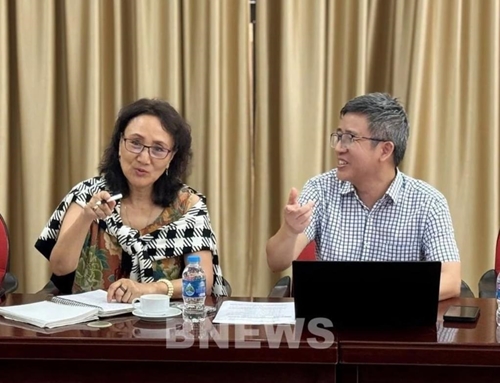Nam made the remarks at a working session on June 5 with Bagie Sherchand, Director of Strategic Partnerships and Alliances at the National Cooperative Business Association – CLUSA International, focusing on collaboration in implementing sanitary and phytosanitary (SPS) commitments.
    |
 |
|
Bagie Sherchand, Director of Strategic Partnerships and Alliances at the National Cooperative Business Association – CLUSA International (left) and Ngo Xuan Nam, Deputy Director of the Vietnam Sanitary and Phytosanitary Notification Authority and Enquiry Point at a working session in Hanoi on June 5 (Photo: Bnews) |
According to Nam, Vietnam’s legal framework governing fruit imports and exports is now relatively comprehensive. However, a lack of understanding of each country’s regulatory requirements among some exporters and importers continues to cause procedural difficulties. He suggested both sides enhance information-sharing through industry associations, particularly in key areas such as plant quarantine and food safety.
He noted that as Vietnam’s national contact point for SPS issues with trading partners, including the U.S., the office has assisted businesses, local authorities, and industry associations in meeting SPS requirements.
It also works closely with ministries and sectors such as the Ministries of Health; Industry and Trade; and Finance to align national policies with international standards. In addition, SPS Vietnam has organized training and capacity-building activities to strengthen domestic implementation of SPS regulations, he added.
Nam expressed his hope for technical support from NCBA CLUSA International, particularly in sharing governance models, applying digital technologies, and establishing early warning systems for technical trade barriers. He stressed that many Vietnamese farmers, cooperatives, and enterprises still face challenges in meeting the stringent SPS standards of demanding markets such as the U.S.
For her part, Sherchand welcomed the prospect of future cooperation, especially in the fruit and vegetable sector. She expressed her organization’s interest in understanding the challenges facing exporters and importers of both sides, including regulatory inconsistencies and inefficiencies, in order to jointly address them. She added that the organization also hopes to provide technical support to boost fruit and vegetable trade, particularly Vietnamese exports to the U.S.
Sherchand acknowledged Vietnam's SPS regulations are relatively comprehensive but noted that U.S. businesses still face hurdles in navigating trade procedures. She recommended further discussions to simplify processes and promote the adoption of digital solutions to enhance efficiency and facilitate trade.
Having understood the challenges faced by Vietnamese farmers and cooperatives in meeting international standards, she said her organization hopes to cooperate in helping them deliver safe, high-quality products that meet consumer expectations while complying with regulatory requirements.
Nam noted that the Vietnamese Government is making significant efforts to simplify administrative procedures, not only for domestic enterprises but also for foreign investors. He said the Ministry of Agriculture and Environment is actively promoting digitalization and the use of electronic systems in administrative processes.
Earlier, on the evening of June 4, Nam held a working session with Dean Smith, an agriculture and economic growth expert from Partners of the Americas, a U.S.-based organization. At the meeting, he emphasized that SPS measures serve as a “key” to unlocking new opportunities for businesses and ensuring smooth and sustainable two-way trade.
For Vietnamese agricultural products to successfully enter the U.S. market, transparency and close coordination on SPS measures are essential, Nam said, adding that agricultural product exports today are not merely about selling goods, but about exporting management capacity and trust.
Source: VNA